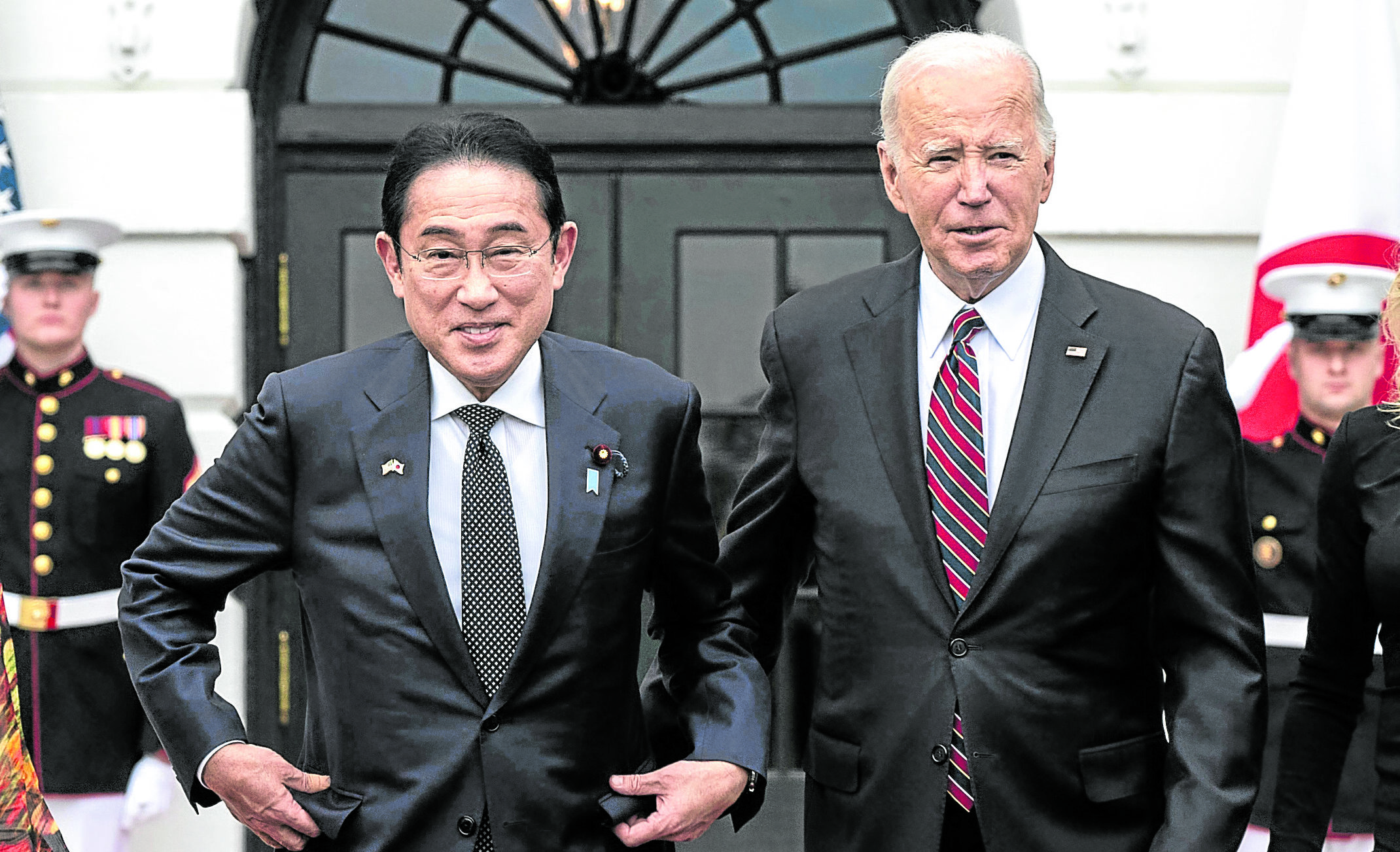
ALLIANCE IN A CRITICAL REGION US President Joe Biden and visiting Japanese Prime Minister Fumio Kishida at the South Portico of the White House in Washington on April 9. AGENCE FRANCE-PRESSE
WASHINGTON, DC — US President Joe Biden welcomed Japanese Prime Minister Fumio Kishida to the White House on Tuesday, kicking off a state visit featuring a major upgrade in defense ties against a resurgent China.
A gala dinner and Rose Garden press conference are on the menu for the formal part of the visit on Wednesday, in a sign of the value Washington places on an increasingly self-confident Japan.
The two leaders are expected to unveil plans to restructure the US military command in Japan—the biggest upgrade to defense cooperation since the 1960s—to make them more responsive against threats in the Asia-Pacific region.
‘Creation over destruction’
Kishida, 66, the first Japanese leader to receive full honors from a US president since Shinzo Abe in 2015, arrived on Tuesday night at the White House with his wife, Yuko.
Biden, 81, and first lady Jill Biden then took the Japanese couple to a swanky restaurant in Washington’s upscale Georgetown area.
Jill Biden said the visit would “celebrate the flourishing friendship between the United States and Japan.”
“Our nations are partners in a world where we choose creation over destruction, peace over bloodshed, and democracy over autocracy,” she told reporters during a preview of Wednesday’s state dinner.
The Japanese visit underscores the importance Joe Biden places on building alliances against countries, such as China, Russia and Iran in an increasingly uncertain world.
White House National Security Adviser Jake Sullivan said the two leaders would “announce measures to enhance security cooperation, to enable greater coordination and integration of our forces.”
PH in trilateral summit
On Thursday, Biden will host the first ever trilateral summit between Japan, the Philippines and the United States to further expand alliances against China in a critical region.
But hanging over the US and Japanese leaders will be the thorny topic of a Japanese takeover of US Steel, a deal opposed by Biden as he faces a tough reelection battle against protectionist former President Donald Trump.
Asia-Pacific allies
On Thursday, Kishida will address both houses of Congress before he and Philippine President Ferdinand Marcos Jr. convene with Biden.
They are the latest Asia-Pacific allies to be hosted by Biden, who was joined by Kishida and South Korean President Yoon Suk Yeol at Camp David in August last year.
Biden has also moved to manage tensions with China, holding a two-hour phone call with President Xi Jinping last week and a face-to-face meeting in San Francisco in November.
According to media reports, Biden and Kishida could agree to the biggest upgrade in US-Japan command and control structures in decades.
More nimble for crises
This would make their two militaries more nimble in a crisis, for example a Chinese invasion of Taiwan, experts said.
The United States has 54,000 military personnel in Japan who must report back to Indo-Pacific Command in Hawaii, around 6,500 kilometers (4,000 miles) away and 19 hours behind, for joint operation matters.
The two countries may also agree to allow large US warships to undergo repairs at private shipyards in Japan, and to joint production of defense equipment, according to media reports.
Staunchly pacifist for decades, Japan has in recent years made “some of the most significant, momentous changes” since World War II, US Ambassador to Japan Rahm Emanuel said ahead of the visit.

